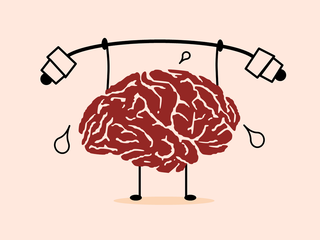Dementia
12 Lifestyle Choices That Can Save Your Brain, Starting Now
At any age, you can lower dementia risk by controlling these 12 risk factors.
Posted January 28, 2021 Reviewed by Kaja Perina

People think of Alzheimer’s disease and other types of dementia as diseases of the elderly. While the incidence of dementia does increase with age, the seeds of dementia can be sown long before that.
In fact, harm to the brain can begin in infancy, for example, when babies are exposed to high levels of air pollution. That and other risk factors continue into middle age and beyond.
Fortunately, research evidence is building that there is much we can do at any age—from childhood to elderhood—to protect our brains from the ravages of mental decline.
In this article, I’ll describe recent science-based discoveries about significant causes of dementia plus recommendations to prevent or delay mental decline. After all, “We all want our cognitive lifespan to match our life span—we can’t wait until signs of cognitive decline appear. We must be proactive now.” These words from Lisa Mosconi, associate director of the Alzheimer’s Prevention Clinic at Weill Cornell Medical College, can serve as a rallying cry.
12 Risk Factors for Dementia
“Dementia” is defined as a group of symptoms that affect memory, normal thinking, communicating, and reasoning ability, sometimes making it difficult for sufferers to perform even simple self-care tasks such as bathing and eating. Alzheimer's disease causes most cases of dementia.
Recently, an analysis of large-scale studies has provided solid evidence that 12 modifiable risk factors account for 40 percent of dementia, according to reports from 2020 by the Lancet Commission, a group of 28 experts who made a thorough study of the available research. While these are not the only risk factors for dementia, they are responsible for a large chunk of the problem. The “Dangerous Dozen,” as I've dubbed them, include:
- Excessive alcohol use
- Head injury
- Air pollution
- Poor early-childhood education
- Mid-life hearing loss
- High blood pressure (hypertension)
- Obesity
- Smoking
- Depression
- Social isolation
- Physical inactivity
- Diabetes
Other factors also play into the risk for dementia, including chronic stress, chronic lack of sleep, certain medications, and harmful chemicals in household products and cosmetics, pesticides, and other toxic chemicals. Genes and family history also play a role. On the bright side, even certain types of genetic risk can be lowered by the lifestyle changes discussed below.
One Other Potent Risk Factor: Your Sex
I was shocked to learn that of all those who end up with Alzheimer’s, 2/3 are women. One reason: The loss of protective hormones such as estrogen at menopause makes women’s brains more vulnerable to cognitive decline, according to Dr. Mosconi. If you are female, consider immediately putting into effect a prevention program like the one below to prevent or delay dementia in your case.
What You Can Do to Control the 12 Key Risk Factors
1. Limit alcohol use.
Excessive drinking interferes with the ability of your brain to generate new neurons and causes shrinkage in the memory center of your brain (the hippocampus), as well as putting you at higher risk for depression, anxiety, and severe brain damage. The CDC recommends not drinking at all or drinking in moderation—no more than two standard drinks per day for men and one for women. More here. If you have a problem with alcohol, get help—AA is free and works for many. Consult with or get therapy from a substance abuse specialist.
2. Prevent head injury.
Falls and head injuries cause physical damage to the brain and disrupt normal brain function. Prevent falls at home, wear your seat belt, and wear appropriate safety gear when exercising. Consider guiding your child toward non-contact sports. If an adult or child gets a concussion, follow the guidelines for safe activity and healing here.
3. Avoid air pollution.
The effects of air pollution on the physical and mental health of both children and adults are dramatic, leading to higher incidents of asthma, lung diseases, mortality, and hospitalizations. Older people can also suffer from damage caused by air pollution. Recent research shows that seniors living in a high-pollution environment for just three years had a higher risk for dementia and also a higher rate of mental health challenges such as depression. A few helpful ideas:
- Download the EPA app, AirNow, and use it to guide your outdoor activity. If you are in a vulnerable age group or have chronic health conditions, avoid going outside during poor air quality days.
- Make the reduction of air pollution a bipartisan issue! Does anyone really want to breathe toxic air? Advocate for cleaner air and water by joining an environmental organization, writing a letter to the editor or your representative, or attending community meetings and speaking out. Support better vehicle emission standards, renewable energy, and efficient public transportation.
- Reduce air pollution in your own home. Turn off unnecessary lights, unplug appliances when you aren't using them, and buy air purifiers if necessary.
4. Provide early education for all children.
The current thinking is that “cognitive reserve,” a storehouse of skills, knowledge, and information in the brain, might ameliorate or prevent some forms of dementia. Possible solution: Daycare, preschool, and primary and secondary education could be free and available to all children.
5. Prevent hearing loss.
Hearing loss can interfere with mental processing. To prevent mental decline, use hearing aids if you need them. To protect your ears, avoid noisy environments and high noise levels, as I learned from painful personal experience.
6. Keep your blood pressure low.
High blood pressure damages your arteries, potentially leading to blood clots, strokes, reduced blood flow and nutrition to the brain, and vascular dementia. Consult with your doctor about this issue and decide together whether medication would help you. Meanwhile, lower your salt intake, get regular exercise, lose weight, and manage stress.
7. Avoid obesity.
Obesity is associated with numerous health risks, including diabetes (see #12 below), heart disease, and some forms of cancer. Follow a healthy eating plan, such as the Mediterranean diet. Limit or eliminate junk food, highly processed foods, and sugary drinks and snacks. Avoid fad diets.
8. Stop smoking and avoid second-hand smoke.
Smoking cigarettes is still the number one cause of preventable deaths in the U.S. While most people know that smoking damages the heart and lungs, smoking also thins the cortex (the thinking area) of the brain, according to research. A thinner cortex is associated with mental decline. Don't self-pollute.
9. Find treatment for depression.
Depression is highly correlated with developing dementia, and dementia can also lead to depression. Treating the mind is good for the brain.
10. Connect with others.
A recent (2020) study found that regular social engagement may provide some protection against dementia. In brain scans, study participants with higher levels of social engagement displayed a healthier brain structure than those with lower levels of social engagement. The researchers caution that this study does not prove causation, but it does suggest that active social engagement can be “prescribed” as a dementia preventive.
11. Exercise and stay physically active.
A boatload of research affirms the physical and mental health benefits of regular exercise. Adopt a formal exercise program if possible. Stay active with “exercise snacks” and household chores. Exercise can even prevent the progression of mild cognitive impairment (MCI) to more serious dementia, according to recent studies.
12. Prevent diabetes.
Because diabetes can damage your blood vessels, it increases the risk of vascular dementia. “This type of dementia occurs due to brain damage that is often caused by reduced or blocked blood flow to your brain,” according to the Mayo Clinic. Your doctor can prescribe appropriate medications, as well as provide guidance on controlling blood sugar, exercising, and following a healthy diet.
These suggestions are by no means the only possible tools in your healthy-brain toolbox. Research points to many other factors as possible brain preservers, including these: challenging your brain with new and interesting activities, finding a motivating purpose in your life, cultivating an optimistic mindset, sleeping 7-9 hours per night, preventing periodontal disease, reading, eating a Mediterranean style diet, and dancing. Yes, dancing.
In the United States and other advanced countries, the number of people with dementia has risen. But the percentage of people with dementia has fallen due to better medical practices and lifestyle changes like those cited above. Still, it is poignant to realize that poor and lower-income people will be at a lifelong disadvantage because they often must live in polluted areas with cheaper rent and have less access to brain-building early childhood education. Hopefully, we can remediate these problems.
"We are learning that tactics to avoid dementia begin early and continue throughout life, so it's never too early or too late to take action," says Lancet commission member Lon Schneider.
© Meg Selig, 2020. All rights reserved. For permissions, click here.
For more, see my book, Silver Sparks: Thoughts on Growing Older, Wiser, and Happier, and my blog, "10 New Brain-Saving Ideas from 2021 Research."
Facebook image: Rido/Shutterstock
LinkedIn image: Koldunov/Shutterstock
References
“We all want our cognitive lifespan…”. Mosconi, L. (2020). The XX Brain: The Groundbreaking Science Empowering Women to Maximize Cognitive Health and Prevent Alzheimer’s Disease. NY: Avery/Penguin Random House.
Dementia prevention, intervention, and care: 2020 report of the Lancet Commission - The Lancet




